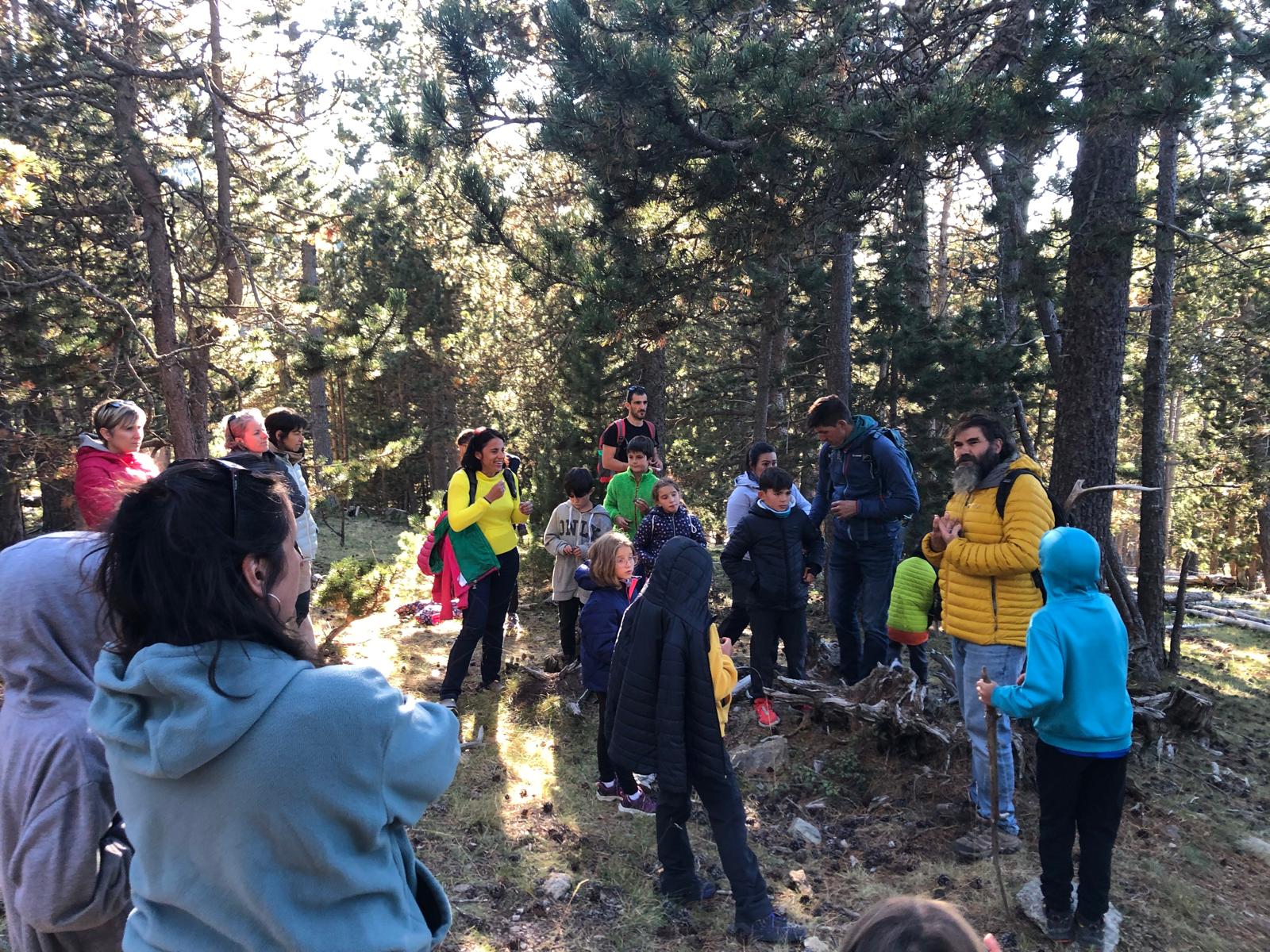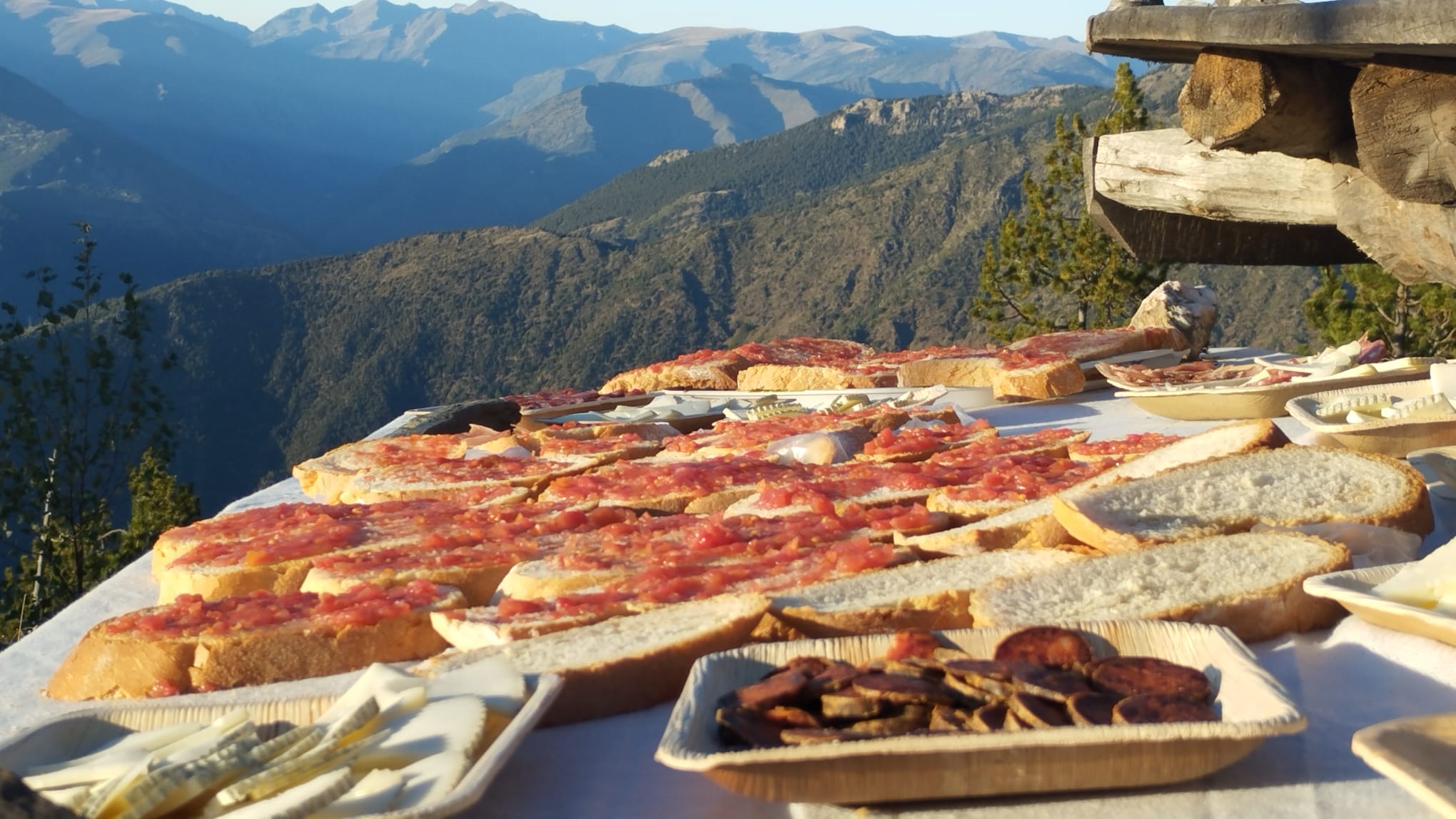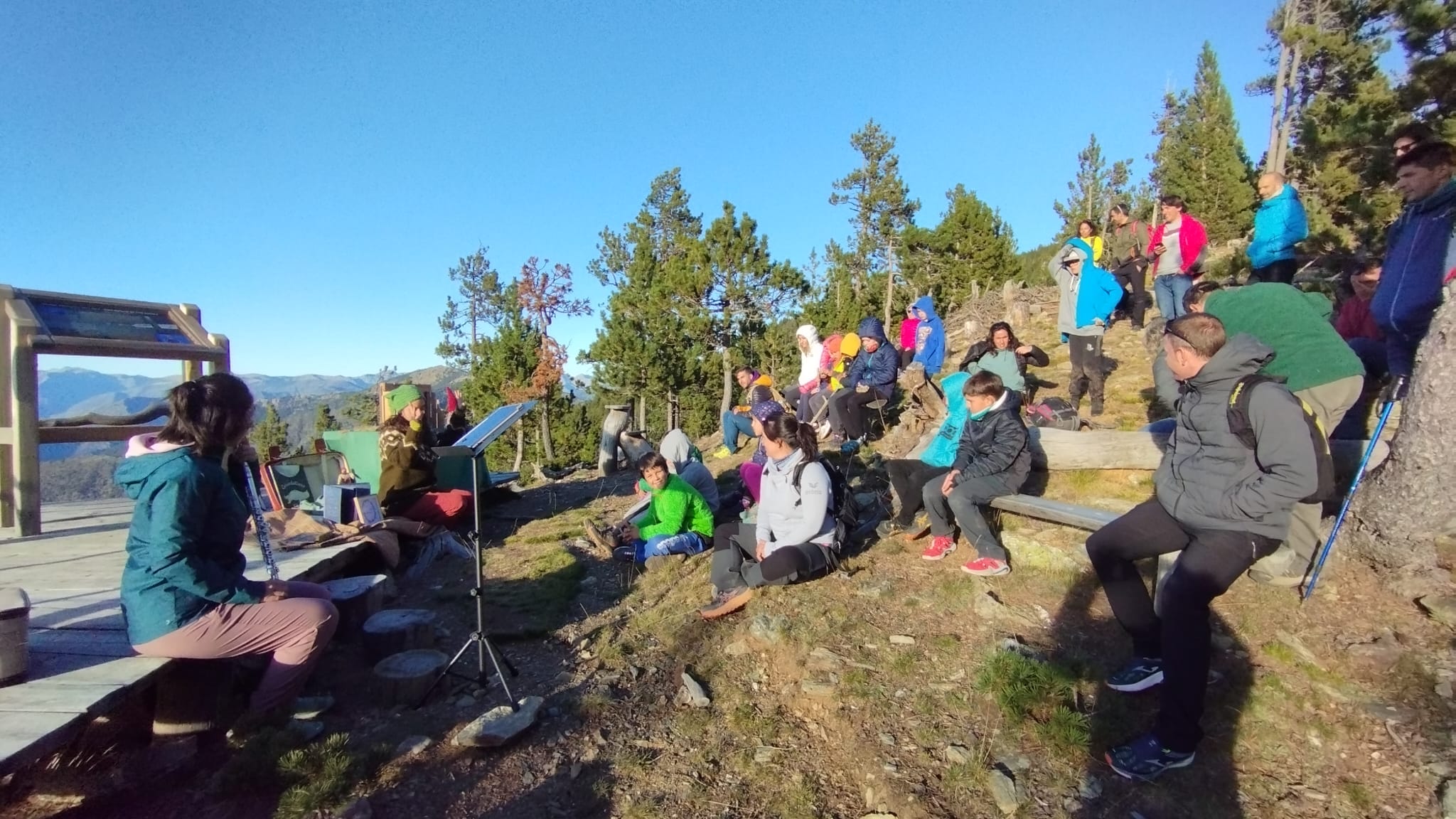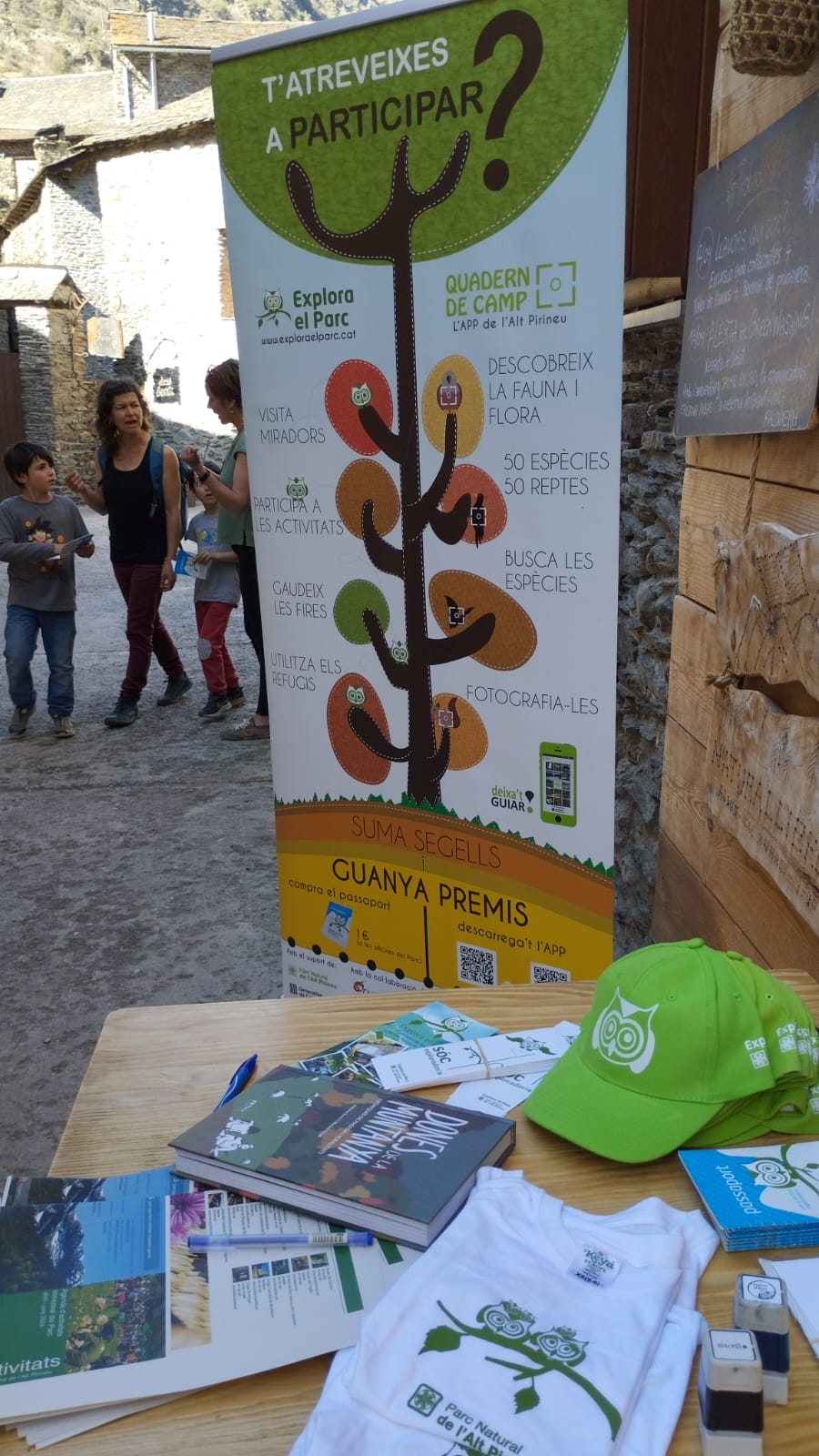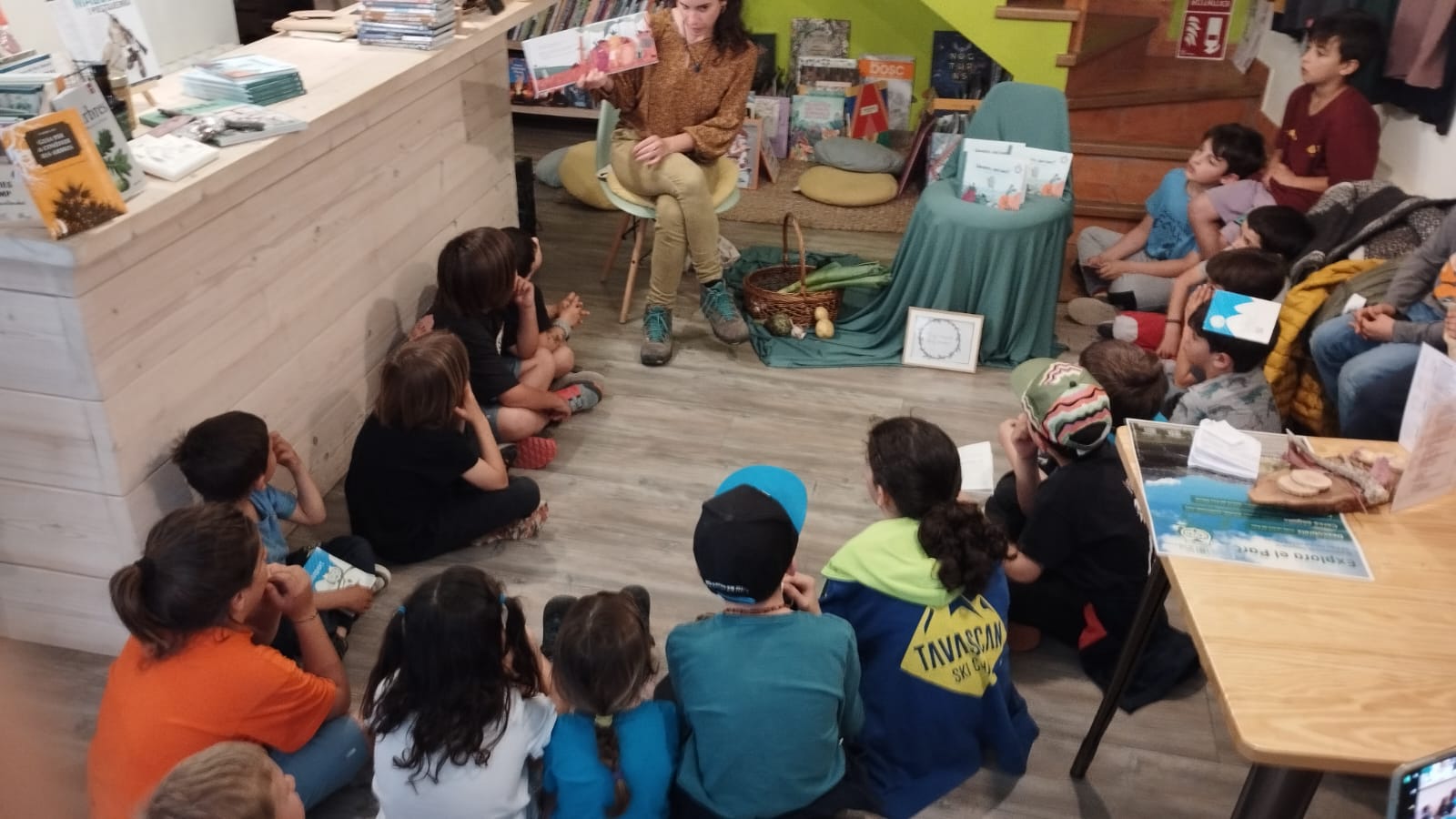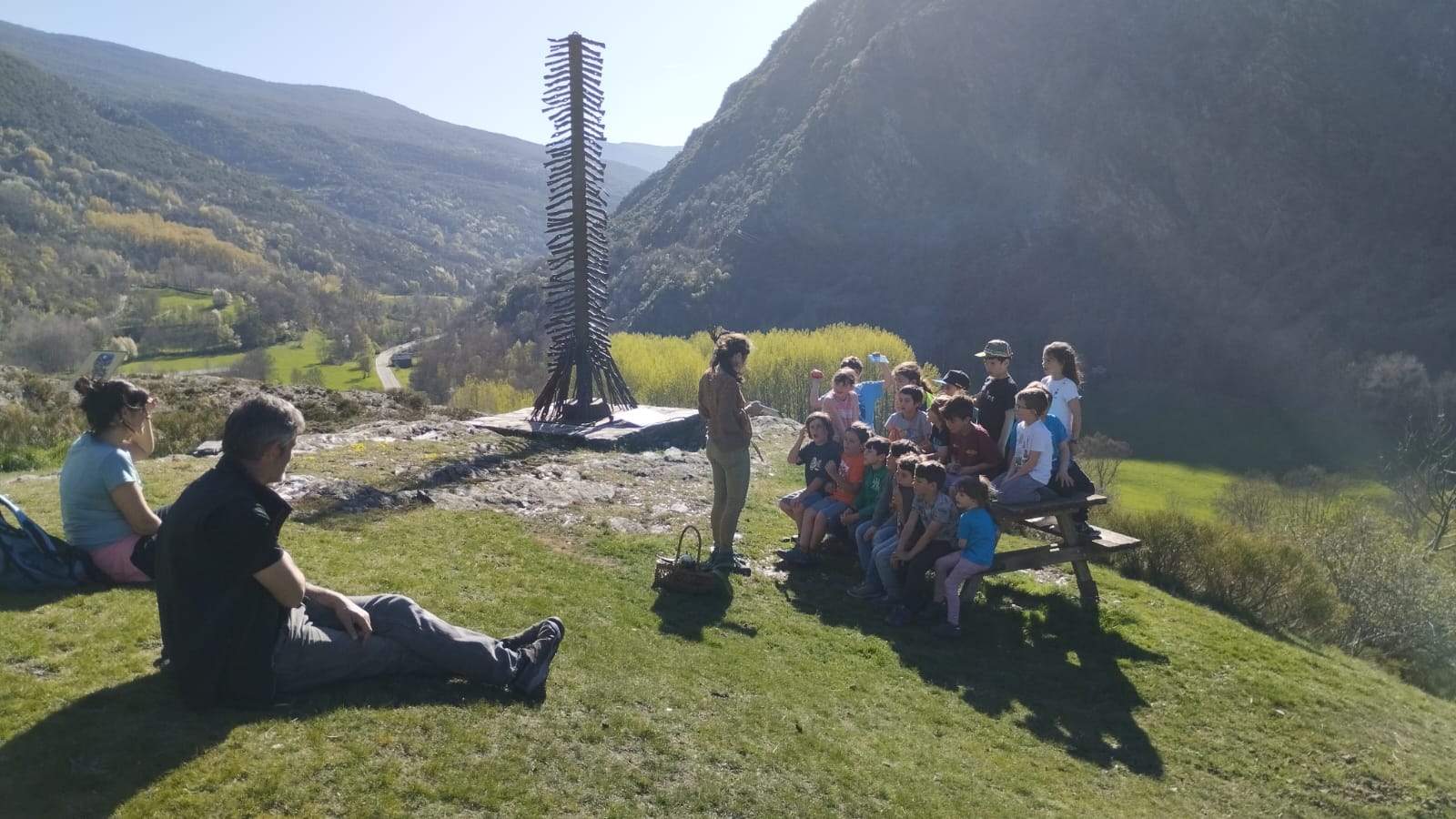Reconnecting with nature
Explora el Parc.Turisme en família
Explore the Park. Family Tourism Program in the High Pyrenees Natural Park (Catalonia)
The Explora el Parc programme of the Parc Natural de l’Alt Pirineu (PNAP) is based on a structural pillar that is entirely linked to rurality and climate change. It is a programme that uses a stampable passport as the main instrument for achieving the set objectives. The programme is aimed at two different groups of people with different objectives, but united by their contribution to the challenges of the rural world and climate change. The objective is self-knowledge of the park natural.
Spain
Regional
Parc Natural de l'Alt Pirineu (Alt Pirineu). Lleida. Catalonia
It addresses urban-rural linkages
It refers to other types of transformations (soft investment)
Yes
2024-12-31
No
No
No
As an individual partnership with other persons/organisation(s)
The passport is used to collect stamps spread throughout the park. By collecting stamps, rewards are obtained and there are various ways to obtain them. Both the stamps and the rewards first generate knowledge of suppliers and services in the territory and then consumption of these. Therefore, changes in consumption and usage habits are achieved that are closely linked to policies against climate change and that favour and strengthen rurality, its economy and its image. In this case, for the first target group, the programme does not function as a tourist instrument but rather as an educational, self-esteem, participatory and fully rural instrument. It is also an environmental education programme for the park's rural schools, encouraging all school pupils to have a passport and stamp it in as many activities linked to the park (workshops, meetings, fairs, etc.) as possible during school hours. In the case of the second target group, visitors, the programme generates responsible tourism, which, while consuming territory, proximity and local organic products, is formed in content and habits. The stamps for both target groups can be obtained in different ways; (1) consuming products made in the park in certain establishments (PNAP Producers), (2) consuming tourist or educational services from local companies accredited by the Park, both scheduled in the park's agenda and outside of it, (3) participating and/or consuming at the product fairs held in the park throughout the year (cheese, livestock, art...), (4) tracing a series of reliefs located in the 48 panoramic viewpoints of the park and finally (5) delivering materials or fulfilling challenges that the program launches periodically. In this sense, four Explora el Parc days are organized, to obtain the maximum number of stamps in one day and at the same time generate an attractive and important alternative for local consumption. As indicated by the New European Bauhaus Compass.
proximity
nature
local
livestock
family
• Generate an environmental education program, responsible family tourism and territorial self-knowledge of the local population.
• Educate and carry out direct actions linked to climate change adaptation; knowledge of the problem, change of habits and consumption.
• Link and strongly channel rurality to the tourism and environmental education model.
• Create a motivational instrument for the children who live in and visit the park, which is fun.
• Achieve loyalty and return among the families who visit us.
• Carry out actions that make rural tourism responsible tourism and linked to the people who live in the park, committed to rurality and climate change.
• Make children the protagonists of the territory, both inhabitants and visitors, achieving, together with them, to involve their families in the knowledge and consumption of the rurality of the park, its heritage and involve them in a change of adaptive habits to climate change.
• Generate materials, audiovisual media, communication… adapted and directed to children and their families, inhabitants and visitors.
• Create an experiential game that lasts over time, is fun and aware of the park, climate change and the rurality that surrounds it.
• Generate a brand of its own, responsible, fun, inserted in the territory, that communicates well and that responds to the fulfillment of its commitments (rewards…).
• Edit an original and motivating passport, which is the main instrument to achieve the set objectives.
• Meet the objectives established by the European Charter for Sustainable Tourism of the Alt Pirineu.
• Educate and carry out direct actions linked to climate change adaptation; knowledge of the problem, change of habits and consumption.
• Link and strongly channel rurality to the tourism and environmental education model.
• Create a motivational instrument for the children who live in and visit the park, which is fun.
• Achieve loyalty and return among the families who visit us.
• Carry out actions that make rural tourism responsible tourism and linked to the people who live in the park, committed to rurality and climate change.
• Make children the protagonists of the territory, both inhabitants and visitors, achieving, together with them, to involve their families in the knowledge and consumption of the rurality of the park, its heritage and involve them in a change of adaptive habits to climate change.
• Generate materials, audiovisual media, communication… adapted and directed to children and their families, inhabitants and visitors.
• Create an experiential game that lasts over time, is fun and aware of the park, climate change and the rurality that surrounds it.
• Generate a brand of its own, responsible, fun, inserted in the territory, that communicates well and that responds to the fulfillment of its commitments (rewards…).
• Edit an original and motivating passport, which is the main instrument to achieve the set objectives.
• Meet the objectives established by the European Charter for Sustainable Tourism of the Alt Pirineu.
- A group of more than 750 families, representing an environment of more than 3,200 people who know the programme and have been linked to it in some way at some point.
✓ A group of children who have grown up playing with the programme and who know the park and its producers and who are surely the best ambassadors for it.
✓ A specific programme of family tourism and environmental education, well-organised, with materials and infrastructure at their service, which strengthens the park's offer and, at the same time, the entire tourism sector of the territory. Hotels and rural houses can offer the programme and even give away the passport to their clients.
✓ A powerful channel for disseminating and distributing the park's products and those of its producers.
✓ A space for carrying out actions to adapt to climate change and to educate inhabitants and visitors on habits and solutions to mitigate it.
✓ A brand, that of Explora el Parc, known in the territory and present in many establishments in the park.
✓ A set of 40 alliances that make the programme stable in rural areas.
✓ A stable relationship between the park and the three professional promoter companies that, after 11 years of working together on this programme, maintain their enthusiasm and a strategy for the future. An example of public-private collaboration.
✓ An innovative programme within the autonomous and state framework that has as a reference pioneering European projects in different member states.
✓ A group of children who have grown up playing with the programme and who know the park and its producers and who are surely the best ambassadors for it.
✓ A specific programme of family tourism and environmental education, well-organised, with materials and infrastructure at their service, which strengthens the park's offer and, at the same time, the entire tourism sector of the territory. Hotels and rural houses can offer the programme and even give away the passport to their clients.
✓ A powerful channel for disseminating and distributing the park's products and those of its producers.
✓ A space for carrying out actions to adapt to climate change and to educate inhabitants and visitors on habits and solutions to mitigate it.
✓ A brand, that of Explora el Parc, known in the territory and present in many establishments in the park.
✓ A set of 40 alliances that make the programme stable in rural areas.
✓ A stable relationship between the park and the three professional promoter companies that, after 11 years of working together on this programme, maintain their enthusiasm and a strategy for the future. An example of public-private collaboration.
✓ An innovative programme within the autonomous and state framework that has as a reference pioneering European projects in different member states.
The Park has shown a special sensitivity to accessibility, different mobility needs, different physical abilities, and also local products and families. In 2013, several panoramic viewing points had already been built, following a strategy that has since proven very successful, of creating milestones halfway between the most physically demanding areas: lakes and peaks. This strategy generated a special interest for families who saw in these viewing points the physical scale that children could generally reach and take on as a challenge. Actions had been taken to organize local producers, create a powerful and dignified image of their products and their work, which had begun to generate dynamics between them and valorization of their products (Fira de Productes PNAP, Del Tros al Plat…). The aim was to generate loyalty to the territory (so that people would have reasons to return), to generate actions and attitudes towards adaptation to climate change (responsible tourism models, knowledge of the problem and resolutions, by locals and visitors), and to link visits to consumption of the territory and its direct products, in order to collaborate in the rural economy and the settlement of the population. The programme wanted the children to walk motivated by a challenge, that of sealing. To weave these strengths; viewpoints, natural park, local production, rurality, landscape and adaptation to climate change, with the thread of; motivation, fun, responsibility and loyalty. The passport could be the needle that helped us to weave it all, deriving from it, a chain of many elements.
Children and adolescents, together with their mothers and fathers, have always been the main recipients. Groups of young people, families without children and retirees have joined in, who have seen in the challenges of the program a motivation to walk, to get to know the park and its rurality. At the same time, the food sovereignty network formed by the producers has become aware of the value of the project to communicate their work and educate about the consumption of local and organic products, becoming beneficiaries of the program. The allied shops and shelters of the park have found an instrument to better adapt their offer to families and strengthen themselves in front of the main user of the territory. The group of local artists has seen in the program a space for creation, dignification and expression of their work, addressing people, the explorers, who are open and who value it. The hotel sector, including rural houses, have seen in it an alliance that strengthens their offer in an important way. Nature companies, nature lovers who have become parents, and mountain guides have found in the passport a fun, original and powerful environmental education tool to communicate ideas about nature conservation, sustainable rurality and adaptation to climate change. Ski slopes and town councils are also beneficiaries, as it provides tools that help them to plan responsibly and carry out actions in favour of the community and nature.
The power of environmental education and family tourism in educating children about the value of rural life, the consumption of local products, the importance of natural parks and the reality of climate change. The value of devoting effort and money to the youngest and to families, capable of making brave decisions and adapting to the needs of rural life. The strength of nature and the enormous educational power it has, especially towards the youngest members of society. The importance of play as the main educational element with which to learn habits and behaviours that are consistent with rural life, conservation and climate change. Combining fun and commitment is a lesson learned to continue generating an attractive and useful programme over time. Art and music in nature as elements of communication and surprise, which achieve more successful results. The enormous curiosity of the explorers asking questions and making observations, which have a positive effect on their families and the rest of the participants, generating intense debates in a natural environment that facilitate the fulfilment of the set objectives. The power of local and organic products, which have always been of enormous quality and have generated recognition and commitment to consumption among the participants. The value that the explorers and their families give to the conversations with the producers. And the high recognition among the local population for getting to know, through the program, their own territory and their own producers.
The power of environmental education and family tourism in educating children about the value of rural life, the consumption of local products, the importance of natural parks and the reality of climate change. The value of devoting effort and money to the youngest and to families, capable of making brave decisions and adapting to the needs of rural life. The strength of nature and the enormous educational power it has, especially towards the youngest members of society. The importance of play as the main educational element with which to learn habits and behaviours that are consistent with rural life, conservation and climate change. Combining fun and commitment is a lesson learned to continue generating an attractive and useful programme over time. Art and music in nature as elements of communication and surprise, which achieve more successful results. The enormous curiosity of the explorers asking questions and making observations, which have a positive effect on their families and the rest of the participants, generating intense debates in a natural environment that facilitate the fulfilment of the set objectives. The power of local and organic products, which have always been of enormous quality and have generated recognition and commitment to consumption among the participants. The value that the explorers and their families give to the conversations with the producers. And the high recognition among the local population for getting to know, through the program, their own territory and their own producers.
The passport offers many different challenges; signs where you can trace different icons at each point, stamps for using a shelter in the park, for doing a naturalist workshop with accredited companies, for consuming products from “Parc al Plat”, for visiting the producers who make them, for attending agricultural fairs in the area… having intertwined so many different aspects of rurality and nature conservation makes it innovative socially and methodologically. The alliance between “Explora el Parc” and “Parc al Plat” strengthens food sovereignty, the fixation of people in rural areas and reduces CO2 emissions, through a game full of challenges; an innovative methodology. It is also about meeting the objectives of the European Charter for Sustainable Tourism of the Alt Pirineu, obtained in November 2023 and in which the program participates. The Explora el Parc days (4/6 per year) are an innovative element in the rural environment, mixing in an attractive way, during one day; stamps, consumption of local agricultural products, art, music, reading, interpretation of the landscape. This minimizes car travel and provides non-polluting alternatives, with the aim of reducing gas emissions. These are also the first actions that are being successfully organized during the ski season. They propose alternatives that are consistent with climate change and the increasingly common lack of snow, an innovative action both technologically and socially. Finally, participation in the Smartwellgraz project, linking and obtaining stamps with the location of livestock with GPS collars.
During the 10 years of the programme, main and secondary actions (collaborations) have been carried out. The activity can be consulted on the social networks of Explora el Parc and PNAP. The rural and business fabric of the park has always been involved in the design of the actions. Priority has been given to alliances that make the programme more stable and extend it throughout the territory. The following stand out: • Publication on paper of 1,000 passports in Catalan/Spanish and 500 in English/French. • Generation of: website, YouTube channel, Instagram and Facebook, assets. • Edition of reward materials: stickers, pencils, caps, t-shirts, a children's story, bookmarks, postcards, sandwich wrappers... • Informative materials; a brochure, a catalogue of proposals, four newsletters, a roll-up, an informative poster... • 49 stamping points (badges and wooden structures adapted to children). • 40 alliances with local companies, shops, shelters, guides, producers (with an agreement). • 5 Explore the Park clips. • Explore the Park days (8 per year) combining local food, stamps, artistic performance, walk with interpretation and sale of products. • Alliance with “Parc al Plat”, providing food sovereignty to all actions. • Participation in 5 annual fairs and 2 mountain races, in the park territory. • Collaboration with the PNAP ski resorts generating alternatives in a future debate on the subject. • Collaborations with artistic and musical groups in the park. • Generating social economy, paying fairly for all services. • School campaigns teaching the program through workshops on adaptation to climate change and rurality.
It is easy to replicate, as the programme shares common objectives with all protected areas. All of this is already being done, but it is often difficult to involve family tourism and the inhabitants themselves in the parks. Family tourism is the most important potential and real type of tourism in protected areas, so they are and should be the main alliance, together with the people who live there (who should be, more than alliances, protagonists). Therefore, using the same strategy that has proven successful in the PNAP may, a priori, be strategic and interesting. However, it requires a minimum budget to provide continuity, response (very important in a project of these characteristics) and to grow progressively in alliances and challenges. The PNAP is willing, as is the promoter group, to help in its implementation in other areas of the network. In fact, alliances could be established between different parks, where the passports, from one place and another, are complementary, with different animals as a mark, which favour the exchange of visitors, rurality and knowledge.
The present programme makes use of all the strengths of the territory linked to adaptation to climate change; products that are responsible with regard to climate change, whether consumer or service, are those that can be stamped. Packages are also proposed to obtain the maximum number of stamps by avoiding long car journeys and providing easy alternatives on foot, with the clear objective of reducing gas emissions. But also by converting the Explora days into the first alternative actions that are being organised in the ski season to begin to look for alternatives that are coherent with climate change in these highly affected areas. Following Manual 13 “Protected areas in the context of global change: incorporating adaptation to climate change in planning and management”
A group of more than 750 families, representing an environment of more than 3,200 people who know the programme and have been linked to it in some way at some point.
✓ A group of children who have grown up playing with the programme and who know the park and its producers and who are surely the best ambassadors for it.
✓ A specific programme of family tourism and environmental education, well-organised, with materials and infrastructure at their service, which strengthens the park's offer and, at the same time, the entire tourism sector of the territory. Hotels and rural houses can offer the programme and even give away the passport to their clients.
✓ A powerful channel for disseminating and distributing the park's products and those of its producers.
✓ A space for carrying out actions to adapt to climate change and to educate inhabitants and visitors on habits and solutions to mitigate it.
✓ A brand, that of Explora el Parc, known in the territory and present in many establishments in the park.
✓ A set of 40 alliances that make the programme stable in rural areas.
✓ A stable relationship between the park and the three professional promoter companies that, after 11 years of working together on this programme, maintain their enthusiasm and a strategy for the future. An example of public-private collaboration.
✓ An innovative programme within the autonomous and state framework that has as a reference pioneering European projects in different member states.
✓ A group of children who have grown up playing with the programme and who know the park and its producers and who are surely the best ambassadors for it.
✓ A specific programme of family tourism and environmental education, well-organised, with materials and infrastructure at their service, which strengthens the park's offer and, at the same time, the entire tourism sector of the territory. Hotels and rural houses can offer the programme and even give away the passport to their clients.
✓ A powerful channel for disseminating and distributing the park's products and those of its producers.
✓ A space for carrying out actions to adapt to climate change and to educate inhabitants and visitors on habits and solutions to mitigate it.
✓ A brand, that of Explora el Parc, known in the territory and present in many establishments in the park.
✓ A set of 40 alliances that make the programme stable in rural areas.
✓ A stable relationship between the park and the three professional promoter companies that, after 11 years of working together on this programme, maintain their enthusiasm and a strategy for the future. An example of public-private collaboration.
✓ An innovative programme within the autonomous and state framework that has as a reference pioneering European projects in different member states.

